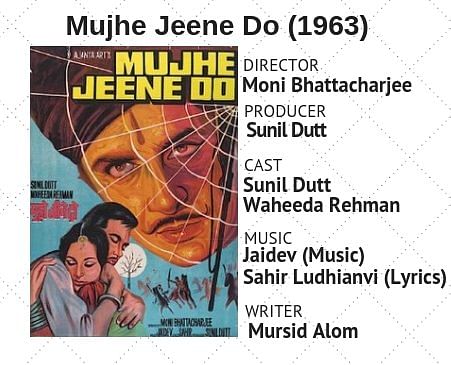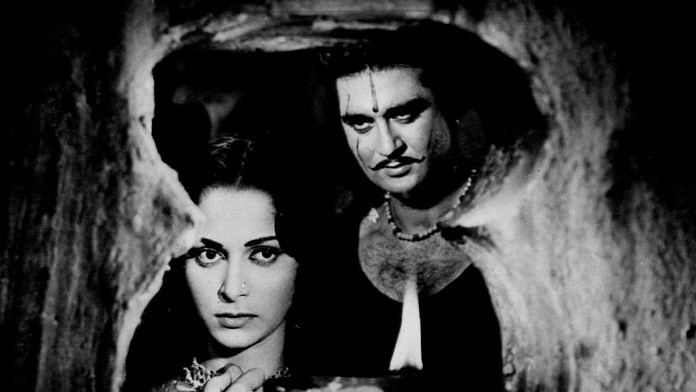One name that will always appear in the list of best actors from the 1950s and ’60s is that of Sunil Dutt. Remembered and loved for films like Yaadein (1964), Padosan (1967), Sadhna (1958) and many more, Sunil Dutt was the quintessential Bollywood hero with his impressive voice, good looks, and versatility. One of his most memorable performances to date came in a 1963 film, Mujhe Jeene Do, which was also the second film he produced under his own banner. On his 14th death anniversary, ThePrint takes a look at the classic film about a dacoit, his crime and personal struggles that won the hearts of Indian audiences.
 The black and white film, directed by Moni Bhattacharjee, follows the story of a feared dacoit leader, Thakur Jernail Singh (Sunil Dutt). Singh pillages, plunders, and kills with abandon in the Chambal valley, Madhya Pradesh. During one such spree, he kills a man, leaving his young wife a widow. The village vows revenge on him for the continued menace to their lives that Singh brings.
The black and white film, directed by Moni Bhattacharjee, follows the story of a feared dacoit leader, Thakur Jernail Singh (Sunil Dutt). Singh pillages, plunders, and kills with abandon in the Chambal valley, Madhya Pradesh. During one such spree, he kills a man, leaving his young wife a widow. The village vows revenge on him for the continued menace to their lives that Singh brings.
Meanwhile, Singh meets and falls in love with a dancer and singer, Chameli Jaan, played by the stunning Waheeda Rehman. They marry and have a son, while Singh remains constantly on the run from the police. He finds himself in a near-fatal situation and sends his wife and son to hide in a village. As fate would have it, it’s the same village that swore revenge on him, and the woman who was made a widow by Singh must now decide the fate of Chameli and her son.
Also read: Sunil Dutt, the legendary actor & director who joined politics on Rajiv Gandhi’s request
Mujhe Jeene Do has been widely regarded as one of the most accurate portrayals of dacoits on the silver screen. It was also made during a period when dacoity was at its peak in the Chambal valley. The film was also praised for its approach towards the topic, for showing the dacoits’ point of view and their issues rather than stereotyping them as gun-toting villains. The storyline is treated with sensitivity and care, and actually makes audiences feel for the protagonist, who is by all means a negative character.
Written by Sunil Dutt’s closest friend, Aghajani Kashmeri, it’s not as straight-forward a story as it may seem. Sunil Dutt manages to bring out the complexity of Singh, who is an outlaw, and knows nothing but a life of crime and plotting but also a man with feelings, and a capacity for love and redemption. Waheeda Rehman beautifully portrays a woman who has been ill-treated all her life, but who is intelligent and stands by her principles. The story also touches upon the topic of inter-faith love and marriage. Singh, a Hindu, marries Chameli, a Muslim without anyone asking too many questions — because, what is religion when you’ve lived on the fringes of society all your life?
Also read: When Sanjay Dutt popped LSD and tried to ‘arrange’ his father’s face
The music, composed by Jaidev and lyricist Sahir Ludhianvi, is another noteworthy feature of this film. Nadi Naare Na Jao Shyam Pai Padoon, Raat Bhi Hai Kuch Bheegi Bheegi, and Ab Koi Gulshan Na Ujde were superhits of the time, and listening to them once will make you understand why. They not only provide the reprieve that Bollywood songs usually do, but take the film’s plot further, which most others don’t.
It doesn’t take much to understand why Mujhe Jeene Do was such a hit. Sunil Dutt did what many other leading actors wouldn’t have done — taken up a negative role at the peak of his career, and turned it into one of his best, without getting stereotyped. He also chose to highlight an issue that nobody seemed to want to talk about, and with that, he won the Indian audience all over again.




What about the excellent song Ab Koyi Gulshan Na Ujday. A song most relevant even now.
Thanks for the article. Will surely watch it on YouTube.